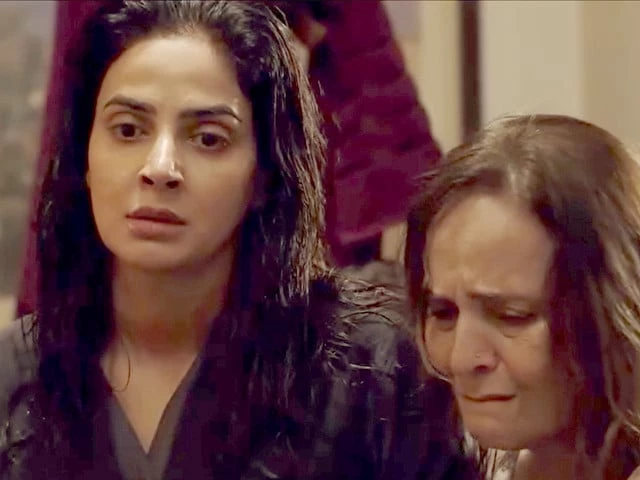Saba Qamar opens up about portraying pain
Actor reveals how embodying a rape survivor in 'Case No. 9' left her emotionally and physically drained

Acclaimed actor Saba Qamar has spoken candidly about the emotional and physical toll of playing a rape survivor in her latest television drama, 'Case No. 9'. Her reflections came shortly after a viral clip showed fellow actors Atiqa Odho, Shamoon Abbasi and Nadia Khan praising her deeply affecting performance.
Responding through an Instagram story, Qamar revealed that "emotional scenes take a real toll on the mind and the body." She wrote that reliving such intense emotions during shooting had begun to impact her health.
"I've learned to take care of myself and breathe through it," she added, describing how the experience, while draining, also reaffirmed her commitment to her craft.
Written by journalist Shahzeb Khanzada and directed by Syed Wajahat Hussain, the Geo Entertainment drama follows Sehar Moazzam - played by Qamar - a strong-willed professional who accuses her boss Kamran, portrayed by Faysal Quraishi, of rape.
The story unfolds through her harrowing struggle for justice within a judicial system that often fails victims, supported by her lawyer Beenish Ali, played by Aamina Sheikh. Produced by Abdullah Kadwani and Asad Qureshi for 7th Sky Entertainment, the series has been hailed for its sensitivity and realism in depicting sexual assault and its aftermath.
Qamar's portrayal has earned widespread acclaim, with critics calling it one of her most powerful and emotionally layered performances to date. In her social media post, she reflected on the emotional cost of embodying such roles, saying that despite the psychological strain, her love for acting remains her source of strength. "It's tough, but this is what I love - and that's where my strength comes from," she wrote.
Her honesty has reignited discussions about the psychological burden carried by actors who immerse themselves in traumatic characters. Many have noted that her comments highlight an often-overlooked reality of acting - the emotional residue left behind after portraying deeply distressing experiences.
The most recent episodes of Case No. 9 have added another layer to that emotional intensity, confronting the suffocating silence that surrounds sexual assault in Pakistan's social fabric.
Episode 8, in particular, has been described as one of the series' most powerful instalments. It portrays how survivors are often trapped not only by their trauma but also by their families' misplaced sense of shame.
In the episode, Sehar is locked inside her home for five days after being raped, as her family desperately tries to prevent the incident from becoming public. The scenes are stark and unsettling - a mirror to a society that too often chooses silence over support.
The episode captures the claustrophobic control imposed on victims, not just by social expectations but by their own loved ones. When Saad's friend Maryam visits and learns that Sehar has been confined, she confronts Sehar's brother, exposing the family's hypocrisy despite their modern education and status.
Maryam's defiant reminder - that Sehar could not have known the rapist's family would be away when she went to their home - forces the audience to confront how easily victims are blamed. Her act of speaking out becomes a pivotal moment, symbolising the courage required to break the silence that society enforces around sexual violence.
Yet, in the drama as in life, her defiance is met not with reflection but anger. The family redirects its frustration towards Sehar once more, furious that their 'honour' has been tainted rather than recognising the injustice she has endured.
The scene serves as a brutal commentary on how communities frequently abandon survivors, pushing them into isolation while protecting reputations rather than people.
Such moments lend 'Case No. 9' its weight and urgency. The drama's writing refuses melodrama; instead, it relies on stark realism, making its characters painfully recognisable. Qamar's controlled yet emotionally charged performance elevates the script, showing Sehar's quiet strength in the face of humiliation, disbelief and loneliness.
The supporting cast - including Gohar Rasheed, Aamina Sheikh, Junaid Khan, Hina Khawaja Bayat, Navin Waqar and Noorul Hassan - reinforces the show's credibility through nuanced portrayals that reflect different shades of complicity and empathy within society.
Director Syed Wajahat Hussain's restrained handling of the subject matter avoids sensationalism, ensuring that the focus remains on the survivor's emotional truth rather than on graphic representation.
'Case No. 9' continues a growing tradition of Pakistani dramas confronting social issues with realism and empathy, joining works such as 'Jama TaqseeM' and 'Parwarish'. However, its distinction lies in how it tackles the emotional aftermath of violence - not just through the lens of legal battles, but through the suffocating silence imposed by family and society.
In exploring Sehar's story, the drama becomes a mirror to countless real-world experiences where victims of sexual assault face isolation rather than solidarity. It challenges viewers to examine the cultural reflexes that prize reputation over justice and silence over healing.
For Saba Qamar, embodying such truth has come at a cost. Her public reflections on the physical and emotional exhaustion of the role reveal not just her artistic depth but her human vulnerability. Few actors are willing to admit that the emotional weight of a performance can linger long after the cameras stop rolling.
Her candour adds another dimension to the conversation around method acting and mental health, raising the question of how far an actor should go to inhabit trauma responsibly. For audiences, her performance serves as both a work of art and an act of courage - one that confronts uncomfortable truths about gender, power and silence in Pakistani society.
Ultimately, 'Case No. 9' is more than a courtroom or family drama. It is a social indictment, one that exposes the moral paralysis of communities that choose concealment over compassion. Through Sehar's story, and through Saba Qamar's unflinching portrayal, the series forces a reckoning - not just with the justice system, but with the conscience of a nation still struggling to listen to women when they speak their pain.
At its heart, the drama - and Qamar's performance - insist that silence is complicity. And breaking it, as Case No. 9 makes painfully clear, demands both strength and sacrifice.






















COMMENTS
Comments are moderated and generally will be posted if they are on-topic and not abusive.
For more information, please see our Comments FAQ